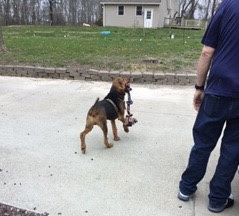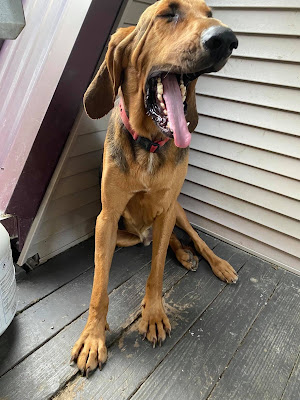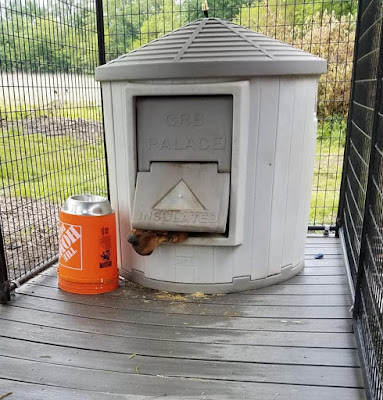Adoption Options: All About Breeders
Have you ever wondered what the difference is between animal shelters, rescues, and breeders? Have you heard of puppy mills but don't know what they actually are? Wondering if it's safe to buy a pet online? Are you considering bringing an animal companion into your family, but don't know where to look? This series is for you! Welcome to part 3 of our 5-part series, Adoption Options.
So what's the big deal with shelters vs. rescues vs. breeders? Many people have strong opinions on this topic, but we aren't here to convince you one way or the other. All options are giving animals who don't have a home, a home, and that's a wonderful thing. This series is here to educate people about the main forms of obtaining animal companionship so folks can make their own educated decisions about what's the best fit for their lifestyle, family, and situation.
Animal Breeders
 |
| Hank, our spokesdog, is from a breeder. |
What are they?
 |
| Hank as a puppy, with both parents pictured above him. |
The adoption process
 |
| Hank is a purebred Bloodhound. |
Controversy
 |
| Hank loves being outdoors and spending days playing with the neighbor dog, Theo. |
Why adopt from a breeder?
Keep in mind
- Puppies are a lot of work--and this isn't specific to breeders, this is general advice. Puppies need to be trained.
- Buying a puppy from a breeder can be very expensive, and you, the buyer, are responsible for all the puppy's vetting. Make sure you are financially prepared before you meet any puppies, and contact your local vet to find out how much puppy healthcare will cost.
 |
| Hank loves a good howl. Time of day doesn't matter, though the presence of squirrels helps. |
Good vs. bad breeders
- Provide genetic health testing/screenings to make sure your animal is not likely to carry inherited health problems
- Provide complete and accurate health records for the animals
- Will show you the animal's parents and their history
- Will show you the environment the animal was raised in, where they play, sleep, etc.
- Spend a lot of time socializing and observing the offspring, at least until they are old enough to be adopted
- Don't sell right away. There will be communication for awhile; they don't sell animals on the spot to the first person who shows up with money
- Screen new homes/potential adopters and ask lots of questions
- Don't sell through pet stores or any other way that doesn't involve in-person meetings and interviews to make sure you and the puppy are a solid match and you'll provide a lifelong good home
- Will take animals back at any point in their lives
- Are often involved with local/national breed clubs, and certainly abide by their codes of ethics
- Breed healthy, happy animals who are kept in clean and humane conditions
- Often don't always have puppies for sale--they give their dams (breeding female dogs) a break for their health and wellbeing
- Care for their animals deeply and aren't just out to make a quick buck
- Provide a pedigree and registration papers made out in your name when you're ready to make the purchase
 |
| Young Hank was very excited about this big rope toy. |
- Are in it just for the money
- Don't care about the wellbeing of their animals
- Don't socialize their animals enough, which can lead to temperament problems
- Don't know about good breeding practices, which can lead to genetic health problems
- Don't perform health screenings or provide any background
- Don't tell you anything about where the animal was raised or their parents
- Sell puppies to whoever shows up with cash/don't screen potential adopters thoroughly
- Are willing to sell through pet stores
- Keep puppies and their parents in inhumane conditions
- Are "USDA Approved"--this is a bad sign. This means the breeder got permission to sell dogs "sight unseen", and in fact the USDA standards are shockingly low for quality of care. People who breed dogs and are USDA-approved can sell dogs as pets, to stores, and for research. These people, broadly speaking, do not care about their animals.
- Better quality of life for the animals
- Dogs live a long time, 10-20 years, so investing the time now to make sure your companion is happy and healthy is worthwhile
- Not financially supporting someone who doesn't treat animals humanely and thus perpetuating the cycle
 |
| Hank rubbing his eyes with his paws is pretty cute. |
How to find an ethical breeder
 |
| After a long day of playing (or sleeping), Hank likes to have a good, big yawn. |
Interview with Howard and Gloria Atkison, adopters of Hank the dog
What made you decide to get a dog?
For the business, a little. Our pound puppy Bessy passed away and I wanted a hound dog. My grandpa used to raise hounds, and I liked the disposition. I wanted a bloodhound because I thought they were a neat looking dog and we have plenty of room for him to run around.
Why did you choose to adopt a dog through a breeder? How did you find a breeder that suited your needs?
The breeder was in Kentucky. We looked at several breeders online and I liked certain characteristics in the dogs' looks from the breeder we found, so that was the starting spot. I liked the coloring of Hank. He was raised on a farm, and so the dogs from this breeder were able to roam around on the farm and see other animals. We had a little bit of back and forth correspondence before we decided to do it. We got pictures, we didn't go down and see him first because it was too far away. They didn't let people come to the farm because it was their grandparents' farm, so for privacy reasons, they met us with Hank at their grandparents' house in town. Since their animals are free range, also, they probably didn't want people in the personal space of the animals.
We met the breeder in the driveway. We got a book with Hank when we got him: records of his shots, who his parents were, and their breedlines. The book also had recommendations for feeding him and taking care of him, a whole mess of stuff to help you get an education on this particular breed of dog. They also had a little gift bag that had a blanket his mom had slept with for her scent, and some toys. Kind of made him feel comfortable with us when we got him.
We had to agree that he would be neutered within a year of getting him. We weren't interested in becoming breeders. We just liked this kind of dog. We've gotten many dogs from the pound before too, as well as 3 Saint Bernards from breeders.
 |
| Sunny days are perfect for playing on the lawn. |
What was the process of buying Hank from the breeder like?
Not a whole lot of paperwork, but they probably looked at our social media.
We sent some follow up messages to them, letting them know how he was doing. He was named already when we got him. They said we could change it, but we didn't. Sir Hank E Pank is his registered name. He was born November 24th, and we brought him home February 9th, and he was already getting big.
Were there requirements for adopting animals from this breeder?
We told them we'd had large dogs before, and we told them what our business [ASL Solutions] was, so they knew we would be people that would take care of him. There was some correspondence about our lifestyle or our age or some things they could assume. I don't remember filling out much paperwork. More just emails back and forth.
What was the fee like?
It was about $400-$600 for him.
 |
| One of Hank's favorite hobbies is lying down. |
What advice would you give to someone who's considering adopting a dog?
Any pet you get, make sure you're giving them a good home. Know what size they'll be and what you have space for. Know if they're playing around kids what their disposition is, do they like cats, what about other animals, are they gonna cause issues with your neighbors. Hank's breed likes to run round with nose to the ground, checking things out. He's got plenty of room to do that. If I lived mostly indoors and kept the dog inside I'm not sure that's the breed I'd go with. He's also got a little bit of slobber with him. You have to consider where the dog's gonna be, where you're at in your life. Dogs can trip you, when you get older you think of those things. I wouldn't adopt a hyper dog if I had mobility issues.
Would you recommend adopting from a breeder to others?
Yeah, I think as long as you do your homework. You know why you're getting what you're getting, then you can kind of read the situation when you're dealing with a breeder or anybody else. What's the disposition, what's the environment where they're coming from. The good news about doing it through a breeder is that you have a lot more connectivity with the dog. With Hank, we know who his parents were and their background. We have a pretty good idea about how he grew up.
I don't care what kind of puppy it is, a puppy is cute. But if you're looking for characteristics in the look of an animal, then seeing what their parents look like can help you see what they might look like. We liked Hank's parents' long ears, the droopy-eared hound dog look. He inherited those same ears.
 |
| Hank doesn't want to come out of his CRB just yet. Unless you've got snacks. |
Conclusion
 |
| Hank as a puppy, all paws and floppy ears that he grew into (eventually). |
Photo credit: Pamela and Lyndsey Mulvey
Sources:
Admin. “Survey Reveals Misconceptions about Purebred Dogs in Animal Shelters.” American Kennel Club, 14 July 2015, www.akc.org/clubs-delegates/government-relations/government-relations-blogs/survey-reveals-misconceptions-purebred-dogs-animal-shelters/.
“Federal Licensing & USDA Standards.” ASPCA, https://www.aspca.org/barred-from-love/laws-rules/federal-licensing-usda-standards.
“How to Find a Responsible Dog Breeder.” The Humane Society of the United States, www.humanesociety.org/resources/how-find-responsible-dog-breeder#:~:text=You%20can%20find%20responsible%20breeders,or%20visiting%20professional%20dog%20shows.
“Rescue vs Shelter vs Breeder Pet: Which Is Right For You?” My Pet Cab, Starwood Animal Transport Services, 4 Nov. 2020, www.mypetcab.com/blog/rescue-vs-shelter-vs-breeder-pet.
Thank you to Erik Streck, Shawn Cruze, Gloria and Howard Atkison, Abri M. Iwanski, and the Fox Valley Humane Shelter for their information and assistance with this series.
Written by Skye I. R. Iwanski



Comments
Post a Comment